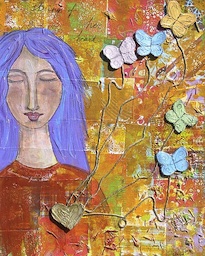
In his book “What Happy People Know,” Dan Baker argues that you can’t be in a state of appreciation and fear, or anxiety, at the same time. “During active appreciation,” Baker writes, “the threatening messages from your amygdala [fear center of the brain] and the anxious instincts of your brainstem are cut off, suddenly and surely, from access to your brain’s neocortex, where they can fester, replicate themselves, and turn your stream of thoughts into a cold river of dread. It is a fact of neurology that the brain cannot be in a state of appreciation and a state of fear at the same time. The two states may alternate, but are mutually exclusive.” Other studies have also highlighted how gratitude can buffer you from the blues, promote optimism, and, in general, make you feel peachy.
However, I do hereby swear that it is possible to be grateful and depressed.
Simultaneously.
For example, I’ve articulated on several posts that I have been in a depressed cycle for about nine months. I have good days, and I’m able to write my blogs, do a little publicity, arrange play dates for the kids, and help with their homework. But I have, for three seasons now, woken up with that nausea in my stomach and the familiar dread that most depressives feel in the morning, of wondering how I’ll make it through the day with what I call “dark vision.”
Today I woke up incredibly grateful for my husband. By the time I got downstairs, he was brewing Godiva chocolate coffee and had the table set for breakfast. He was making the kids’ lunches and making sure our son had his lacrosse stick for practice afterward. I was grateful for my kids: for the creative and sarcastic one who left a poster for me last night that read “I love Daddy more than you,” and for the other one who has a beautiful, sensitive soul and the discipline and determination to–in my opinion anyway–succeed at whatever he wants to do in life. For my family I am incredibly grateful.
However, if learned this afternoon that tomorrow would be my last day on earth, I would be immensely relieved.
I know that seems wrong … that I could be grateful and want to die at the same time. But I guess it’s the difference between a physiological pain–a quiet desperation, or a plea for relief–and the virtues of love, commitment, and appreciation. Professor of Psychiatry Peter Kramer explains this quandary best when he says, “Depression is not a perspective. It is a disease.”
A Beyond Blue reader caused me to think about this. On the combox of my post, “Never Place a Period Where God Has Placed a Comma,” she wrote:
I know how hard it is to fight for sanity when your brain chemistry is askew. However, I sometimes feel you don’t realize how lucky you are. Perhaps I’ve missed posts regarding the blessings in your life, but you have a husband who loves you and supports you and two children, a boy and a girl even. The people you’ve loved, the people who’ve loved you, the joy and heartaches you’ve shared … relationships are where it’s at.
She’s absolutely right. I have so much to be grateful for. And if I haven’t articulated that enough in my blogs, I’m remiss. However, expressing the anguish of depression doesn’t mean I’m not grateful. The love I have for my husband and my kids can’t and won’t stop the pain of depression. And considering that 30,000 Americans kill themselves every year, I would imagine that I’m not alone in saying that. Good and healthy relationships are certainly buffers against depression and anxiety and can aid us in our recovery. But gratitude and appreciation can’t interrupt my mood disorder any more than they can relieve the pain of arthritis.
If I sound defensive, I guess it’s because I used to beat myself up over and over again for not being grateful enough to stop a depressive cycle. And based on my mail from readers, I know that is the case with lots of folks. So, while I continue to record all my blessings in my mood journal each day and say them aloud right before dinner and at bedtime with the kids, I now know that gratitude is a separate animal to my depression, and that sometimes confusing the two, especially while in a depressive cycle, can do more harm than good.
So I take note of my blessings. I thank God many times throughout the day. But if, at the end of my prayer, I’m still depressed … well, that’s okay. Because, as Kramer says, depression isn’t a perspective. It’s a disease.
* Click here to subscribe to Beyond Blue and click here to follow Therese on Twitter and click here to join Group Beyond Blue, a depression support group. Now stop clicking.

